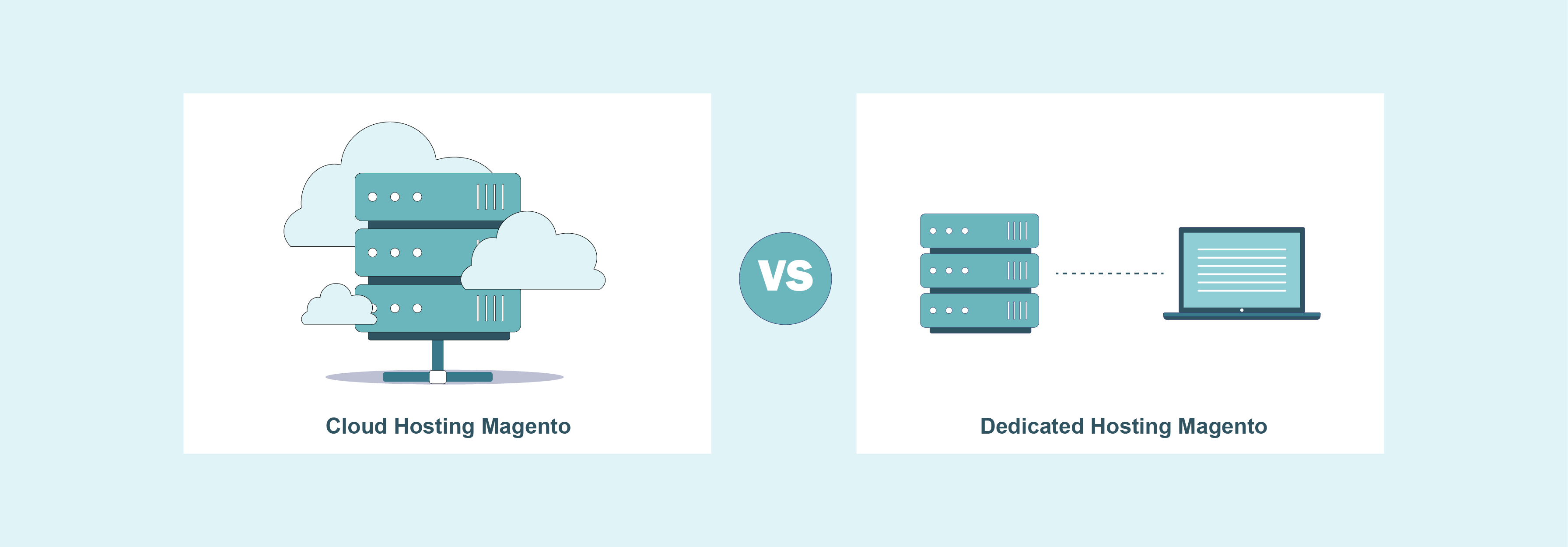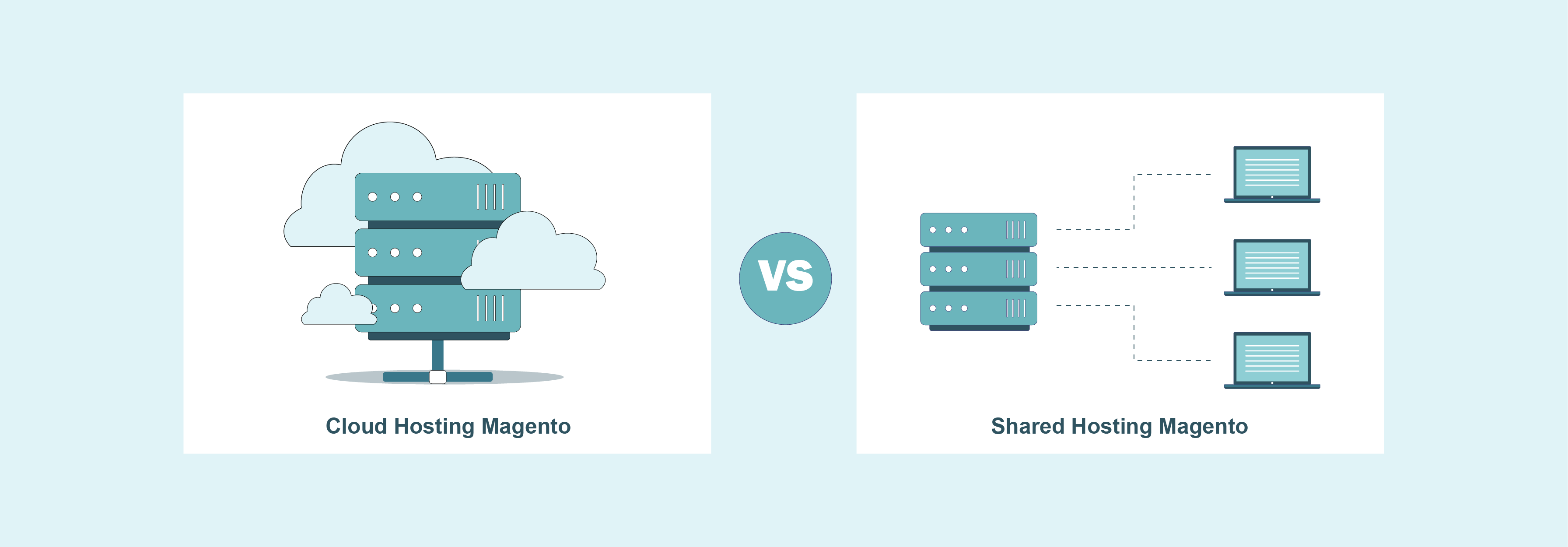
Cloud Hosting Magento: Comparison from Dedicated and Shared Hosting
Cloud hosting Magento is a web hosting service that utilizes multiple virtual servers to host a website or application. Unlike traditional hosting methods such as dedicated and shared hosting, it uses the resources of multiple servers on the cloud. This article will compare cloud hosting Magento to dedicated/shared hosting and highlight the reasons to choose cloud hosting for a Magento store.
Key Takeaways
-
Cloud hosting Magento utilizes multiple virtual servers, offering scalability and flexibility.
-
Provides enhanced performance, speed, and reliable uptime for Magento stores.
-
Integrates advanced security features and support for Magento themes and extensions.
-
Managed services with expert support teams and simplified management tools.
-
Cost-effective with a pay-as-you-go model, more so than dedicated or shared hosting.
What is Cloud Hosting Magento?
Cloud hosting allows for resource sharing and remote access through multiple servers. Managed Magento cloud hosting, specifically supporting running a Magento store on a cloud infrastructure. Major companies like Google and Amazon opt for cloud systems due to their vast resources and flexibility.
Cloud hosting is a form of hosting that utilizes interconnected servers spread across different locations. It allows you to distribute your data across multiple virtual servers. This enables more efficient service delivery to your customers.
While VPS may have limitations on bandwidth and data transfers, cloud hosting does not. In fact, with cloud hosting, you can scale up or down your resources to match the traffic patterns of your Magento store. This is because cloud hosting has vast resources that enable multiple servers to work together.
Why use Magento Cloud Hosting?
1. Multiple Servers

Cloud hosting Magento differs from traditional web hosting as it uses multiple interconnected servers. This allows more resources to be dedicated to your website, resulting in better performance and scalability.
With multiple servers working together, the load on each server is reduced, ensuring faster response times and minimal downtime for your store.
2. Enhanced Performance and Speed
Thanks to its distributed resources, cloud hosting empowers Magento e-commerce platforms with exceptional performance and speed. This means quicker page loading times and a smoother shopping cart experience, which is crucial for retaining visitors and encouraging sales.
With advanced caching tools like Varnish and the robust capabilities of NGINX, cloud hosts optimize the delivery of your site's content.
3. Scalability for Traffic Spikes

Magento stores on cloud hosting can efficiently handle unexpected surges in traffic due to scalable resources. This is essential for store owners anticipating spikes during sales or promotional events.
Cloud hosting plans provide flexible options to scale up RAM and storage as needed, ensuring uninterrupted shopping sessions even during high traffic.
4. Reliable Uptime and Backups
With cloud hosting, e-commerce sites benefit from reliable uptime because providers spread their services across multiple hardware environments, minimizing the risk of downtime.
Additionally, regular backups are managed by the hosting provider, safeguarding your inventory and customer data against loss and making migration or recovery processes more streamlined.
5. Advanced Security Features
Cloud hosting providers prioritize security, offering integrated features such as SSL certificates, firewalls, and DDoS protection, to safeguard your Magento store from potential threats.
Secure payment integrations build customer trust, while SSH and Magento CDN services reinforce the safety and distribution of your site's content globally.
6. Easy Integration of Themes and Extensions
Magento extensions and themes play a significant role in e-commerce sites by expanding functionality and customizing appearance.
Cloud hosting environments usually have the required software versions and expertise. They ensure smooth integration and updates of Magento plugins, themes, and extensions.
7. Expert Support Team

A robust support team is crucial for e-commerce stores. Cloud hosting providers often feature a dedicated team of experts.
These professionals offer 24/7 support via phone, chat, or ticket systems. They aid store owners with everything from account setup to complex software issues.
8. Simplified Management Tools
Magento cloud hosting typically includes user-friendly management panels like cPanel. These panels provide an easy-to-use interface for handling services, products, and configurations.
Additionally, these tools often offer one-click installation features. This allows store owners to focus on sales rather than the technical aspects of managing their company's online presence.
Cloud vs. Dedicated Hosting Magento

Dedicated hosting differs from cloud hosting in leasing an entire server for your website or application. This means the server's resources are solely dedicated to your site, resulting in faster load times and better performance. However, this also means limited scalability as you are confined to the resources of a single physical server.
On the other hand, cloud hosting offers more flexibility and scalability as it utilizes multiple virtual servers. This allows for better resource management and the ability to handle sudden spikes in traffic without affecting performance. Additionally, with cloud hosting, you only pay for the resources you use, making it a cost-effective option.
| Factors | Cloud Hosting | Dedicated Hosting |
|---|---|---|
| Server Deployment and Management | Yes | Yes |
| Server Sharing Model | Dedicated Cloud Server | Dedicated Physical Server |
| Pay-As-You-Go | Yes | No |
| Flexibility | Yes | No |
| Security | Yes | Depends on the user |
| Performance | Fast | Better than shared |
| Reliability | Better than Dedicated | High |
| Multiple Data Centers | Yes | Depends on the vendor |
Cloud vs. Shared Magento Hosting

Shared hosting is a popular option for smaller websites and businesses as it is more affordable than dedicated or cloud hosting.
With shared Magento hosting, multiple websites share the resources of a single server, which can result in slow loading times and potential security concerns. However, it is unsuitable for larger, high-traffic websites like a Magento store.
On the other hand, cloud hosting offers better performance and security compared to shared hosting. This is because each website has its dedicated resources and is not affected by the traffic or activities of other websites on the server.
Additionally, cloud hosting allows easy scalability and customization to meet your specific needs as a Magento store owner.
| Factors | Cloud Hosting | Shared Hosting |
|---|---|---|
| Server Deployment and Management | Yes | No |
| Server Sharing Model | Dedicated Cloud Server | Shared Server |
| Scalability (auto/manual) | Yes | No |
| Pay-As-You-Go | Yes | No |
| Flexibility | Yes | No |
| Security | Yes | Depends on the vendor |
| Instant Provisioning | Yes (in managed hosting) | No |
| Performance | Fast | Slow |
| Multiple Data Centers | Yes | No |
Cloud, Dedicated & Shared Hosting: Tips to Choose the Right One
1. Speed
Site speed is crucial for the user experience and can influence your website’s success. Shared hosting can lead to slower speeds during traffic spikes on other websites sharing the same resources. Cloud and dedicated hosting, with dedicated resources at your disposal, tend to maintain consistent speeds even under load.
Recommendation: For businesses with non-negotiable speed, cloud or dedicated hosting offers a performance advantage over shared hosting.
2. Pricing
When choosing a hosting plan, pricing is often decisive. This is especially true for start-ups and small businesses. Shared hosting generally offers the lowest prices. It leverages the economy of scale by spreading the cost across multiple users on the same server.
It's an excellent starting point for those with a limited budget. On the contrary, although higher in price, cloud and dedicated hosting include a broader range of features and better performance.
Recommendation: Shared hosting is a suitable option if budget constraints are a primary concern. However, investing in cloud or dedicated hosting may prove more cost-effective in the long term. This is especially true for businesses seeking more robust features and expecting to grow.
3. Support
The level of support you receive can affect how quickly and effectively you can resolve hosting issues. Cloud and dedicated hosting often provide more personalized support with higher resource access.
In contrast, shared hosting typically caters to a larger pool of clients, which might dilute the support offered.
Recommendation: For those considering support and service a priority, cloud or dedicated hosting is better suited to meet these needs.
4. Scalability
When your business grows, so does your website traffic. Scalability is simpler with cloud or dedicated hosting due to the availability of additional resources.
Shared hosting restricts your ability to scale up, potentially resulting in slow site performance or even suspensions during traffic surges.
Recommendation: Cloud or dedicated hosting is the strategic choice for businesses with growth in mind due to their scalable nature.
5. Uptime
Uptime is crucial for maintaining an online presence and ensuring a reliable user experience. Shared hosting providers may promise high uptime, but shared resources can result in downtime during traffic spikes, impacting site performance.
On the other hand, cloud and dedicated hosting generally offer superior uptime. This is because dedicated resources ensure stability and reliability.
Recommendation: For basic websites with moderate traffic, shared hosting could suffice. However, for businesses where continuous online availability is vital, cloud or dedicated hosting is a preferable choice.
6. SEO
Search engine optimization (SEO) is essential for online visibility. Google's algorithm favors faster websites, and a dedicated or cloud hosting plan can significantly reduce loading times.
Moreover, the security and reliability of dedicated or cloud hosting can contribute to a more robust SEO ranking.
Recommendation: For those aiming to maximize SEO potential, cloud or dedicated hosting will likely provide advantages over shared hosting due to better speed and security.
7. Security
The security of your hosting service can greatly impact your website. Shared hosting carries higher security risks due to its communal nature. It may leave your site vulnerable if another site on the server is compromised.
Cloud and dedicated hosting typically offer stronger security options and customization to protect your data.
Recommendation: For those prioritizing security, cloud or dedicated hosting is advisable due to their higher control over shared hosting.
15 Factors to Choose the Right Cloud Hosting Magento
1. Server Proximity

Server proximity is the physical distance between your server and your target audience. This factor affects website performance, as a closer server will result in faster loading times. Cloud hosting offers multiple data centers worldwide, making choosing a server location closest to your target audience easier.
2. Reliability and Uptime
High server uptime is critical for an online store’s success. Aim for a managed Magento cloud hosting that promises at least 99.9% uptime, indicating your store will consistently be operational, thus not missing sales opportunities.
3. Magento-Specific Expertise
Select a hosting service specializing in Magento to guarantee expert support for your eCommerce needs. Experienced providers can address issues more effectively and offer Magento-optimized assistance.
4. Support Availability
The necessity for round-the-clock technical support cannot be overstated. Evaluate potential hosts on their support infrastructure, ensuring they provide 24/7 help with a strong track record of swift and proactive responses.
5. Scalable Performance
Your cloud hosting provider should offer easy scalability. This means you can adjust your resources according to traffic demands without the hassle of migrating servers, backed by robust load-balancing to manage traffic surges.
6. Cache Mechanisms
Modern cache technologies like Redis and Varnish Cache are essential for a swift Magento 2 store. By implementing advanced caching, your store can deliver pages rapidly, thus enhancing user experiences and benefiting SEO.
7. Flexibility in Hosting
Customized hosting solutions are critical for meeting unique Magento requirements. Look for hosts offering tailored server setups, software integrations, and specialized support tailored to the Magento ecosystem.
8. Managed Service Tiers
Managed hosting can vary in the level of service provided. A fully managed service covering automatic updates, security patches, and server configurations can significantly reduce the technical burden on store owners.
9. Transparent Pricing Structure

Make a well-informed decision by seeking out hosting providers with clear, straightforward pricing. Avoid hidden costs and seek clarity on billing cycles, payment options, discounts, setup fees, and contract terms.
10. Enhanced Security
Stay mindful of security patches and updates. Choose a cloud host emphasizing strong security practices and regular updates to protect your data from threats.
11. Robust Infrastructure
Consider the full stack of technologies provided, including the web server (such as Apache), integrations with Content Delivery Networks (CDN) like Cloudflare, and the quality of SSD storage for optimal performance.
12. Database and Application Support
Ascertain that the hosting provider supports the latest database management systems and applications vital for Magento's smooth functioning, including search technologies like Elasticsearch.
13. Control Panel Accessibility
A user-friendly control panel is essential for managing your web environment effortlessly. Ensure your selected host offers an intuitive interface for overseeing your store's backend.
14. Processing Power and Resources
Account for CPU allocation, RAM, and other vital resources, ensuring the hosting plan can handle your store's load, especially during peak traffic.
15. Network Stability
Evaluate the hosting service's network infrastructure, including their policies on dedicated IP allocation, to ensure stable and secure connections for your users.
FAQs
1. Why is it important to consider the pricing structure of a hosting provider?
Understanding the pricing structure of a hosting provider helps make an informed decision and avoid hidden costs. Knowing the billing cycles, payment options, discounts, setup fees, and contract terms can help with budget planning.
2. How cloud hosting differs from traditional hosting?
Cloud hosting offers scalability, flexibility, and cost-efficiency compared to traditional hosting. In cloud hosting, resources are distributed across multiple servers, allowing for seamless resource allocation and handling of high traffic. Traditional hosting relies on a single server, making it less flexible and more prone to crashes during peak traffic.
3. Can I migrate my existing store to a new hosting provider?
It is possible to migrate your store to a new hosting provider. Most hosting providers offer migration services or guide the process. However, planning and testing the migration carefully is essential to avoid disruptions in your store's functionality.
4. What are some of the best Magento hosting providers?
Some of the top Magento hosting providers include MGT-Commerce, SiteGround, Bluehost, A2 Hosting, and InMotion Hosting. Researching and comparing different providers is important to find the one that best fits your store's needs and budget.
5. How can I ensure my store has enough resources allocated from my hosting plan?
To ensure your store has sufficient resources, monitoring and tracking your store's traffic and performance is crucial. You can also work with your hosting provider to scale up resources. Choosing a provider that offers flexible scaling options is important for the smooth functioning of your store.
Summary
Cloud hosting Magento enables large stores to handle high traffic and avoid crashes. It also offers scalability, flexibility, and cost-efficiency compared to traditional hosting methods. Migrating your store to a new hosting provider is possible with careful planning and testing. Managed cloud Magento hosting provides expert support, ensuring optimal performance and security for your ecommerce platform.


